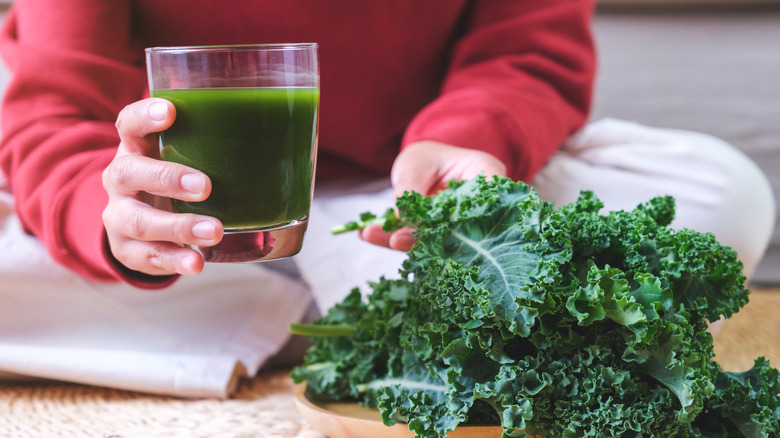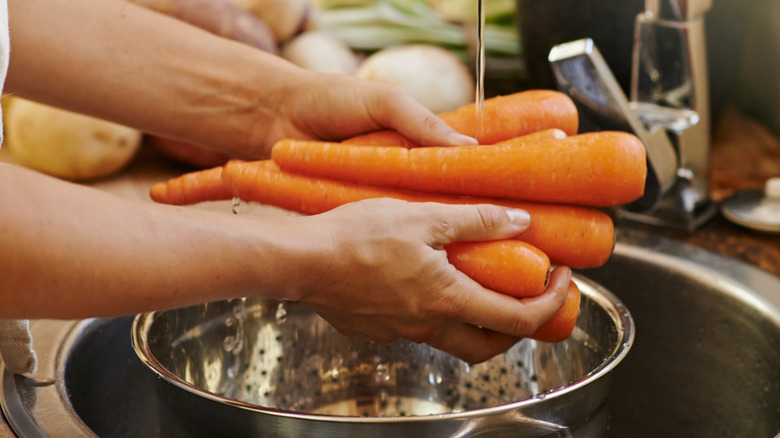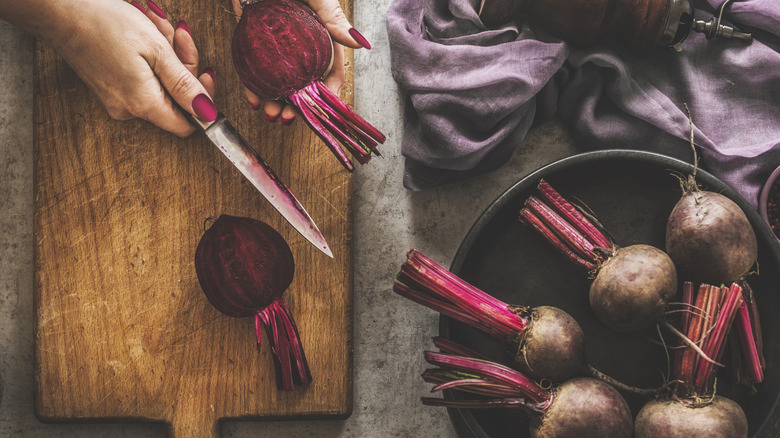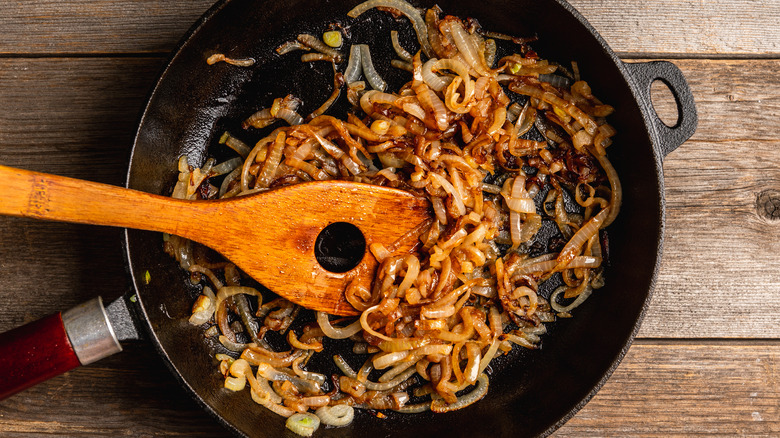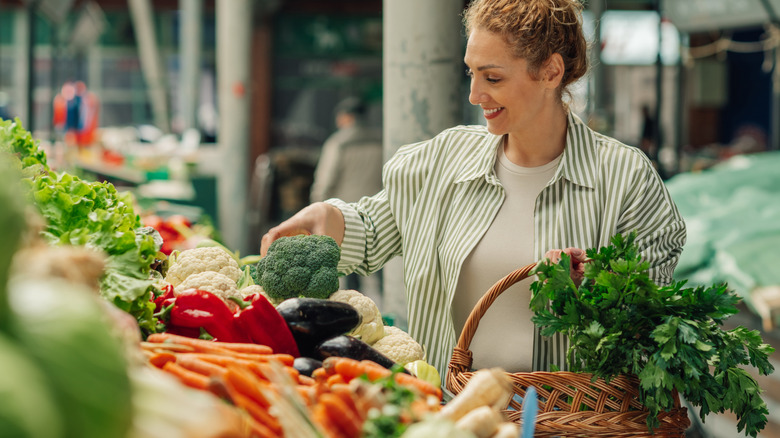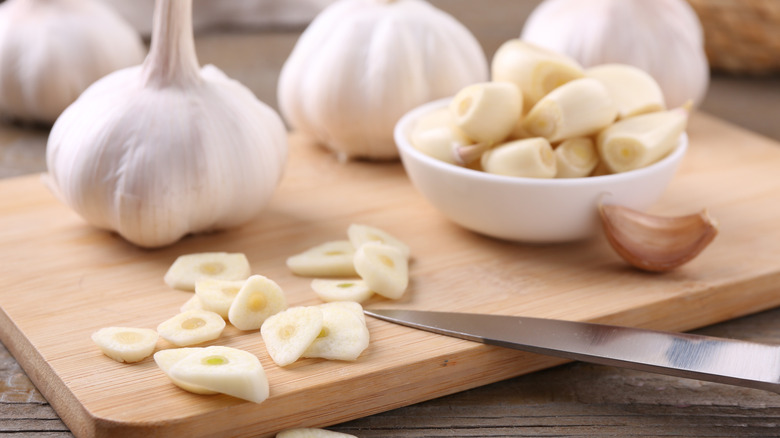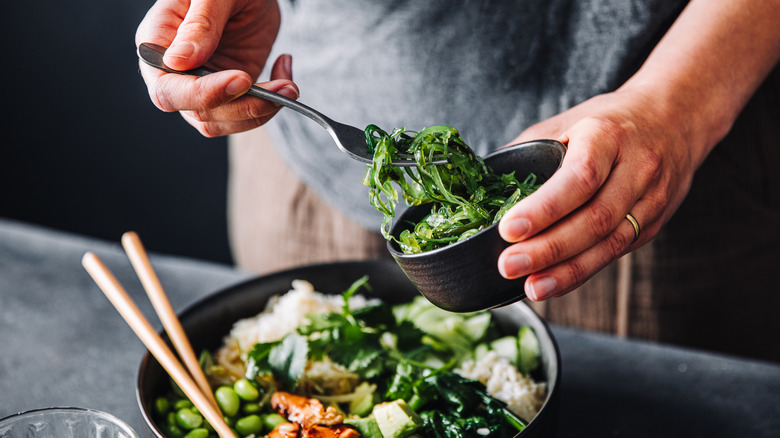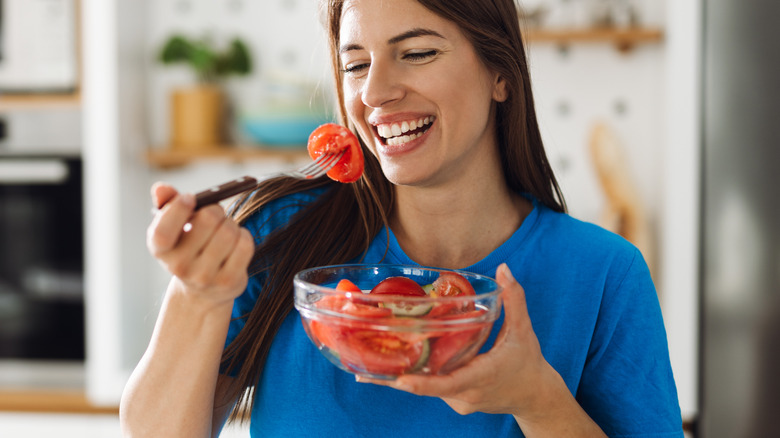The 9 Healthiest Vegetables You Should Eat To Prevent Cancer
There is no denying that a healthy diet has a direct impact on your health. According to Kansas State University, a healthy diet can help lower your risk of developing chronic illnesses, including heart disease, cancer, and stroke. In fact, healthy living, including eating well, getting exercise, and abstaining from tobacco, could reduce your risk of cancer by up to 40%.
The Center for Science in the Public Interest notes that close to 700,000 deaths annually in the United States can be attributed to a poor diet. This is because the typical American diet is high in calories, added sugars, sodium, and saturated fats. (Here's the real difference between saturated and unsaturated fats.) And, most notably, the American diet is sorely lacking in fruits and vegetables. Cancer is the second leading cause of death, with more than 580,000 deaths being attributed to the disease. However, just by adding any of these healthy options to your diet, you could conceivably help to lower your risk of developing cancer.
Kale
A cruciferous vegetable rich in vitamins and minerals, kale is loaded with a wide range of health benefits. Kale is also high in cancer-fighting compounds known as glucosinolates. These compounds break down into other compounds such as sulforaphane and indole-3-carbinol, which may inhibit the growth of cancer cells. They may also cause a type of cell death known as apoptosis, which can prevent cancer from spreading.
Kale also contains other compounds known as phenolics, which function similarly to glucosinolates (via the American Institute for Cancer Research). One of these, caffeic acid, has demonstrated positive cancer-fighting results in the laboratory. In addition, kale contains a flavonoid known as quercetin, which has been shown to have antioxidant properties. Quercetin has been shown to neutralize the effects of free radicals, which may cause damage to cells and to DNA. On top of that, quercetin also has anti-inflammatory properties, which can also be beneficial in preventing cancer.
Carrots
Carrots are a strong ally in fighting cancer, according to the Center for Advancement in Cancer Education. The carotenoids in carrots have strong antioxidant properties, which have the ability to target and eliminate free radicals. They also are high in beta-carotene, which could help reduce the onset of lung cancer, particularly in people who smoke. There is also evidence to suggest that beta-carotene may also be beneficial in staving off prostate cancer.
As reported by a 2020 study published in Nutrients, carrots may be helpful in fighting cancer due to their being a strong source of two natural compounds, falcarinol and falcarindiol, which may help to slow the growth of cancer cells while also reducing inflammation. The study, which included more than 57,000 individuals, found that consuming more than 32 grams of raw carrots on a daily basis helped reduce the risk of developing colorectal cancer by 17%.
Beets
According to a 2021 study published in Food Science & Nutrition, beetroot's nitrates and betalains have demonstrated powerful effects. Betanin has been shown to fight oxidative stress and protect DNA, and may also lower LDL or "bad" cholesterol. Additionally, it has shown promise in blocking the spread of cancer cells and helping in the triggering of cell death.
A 2010 study published in the Journal of Medicinal Food looked at whether or not eating beetroot food coloring could help prevent esophageal cancer in rats. According to the study, the rats that consumed the beet dye had 45% fewer tumors than those that didn't. In addition, the dye also slowed down the growth of abnormal cells and tumors in the esophagus. Upon further testing, researchers also discovered that beet dye reduced the growth of new blood vessels in tumors, which prevented them from growing. It also lowered inflammation and increased cancer cell death.
Onions
Onions contain flavonoids, particularly quercetin, which can be effective in inhibiting the growth of cells. Chemicals present in onions have been shown to effectively cause cell death in both breast and colon cancer cells. These findings were presented in a 2017 study published in Food Research International, which found that extracts from five different onions grown in Ontario were effective at fighting colon cancer cells, and not just in slowing them down. They helped kill these cells off, stopped them from multiplying, and even blocked their ability to spread.
The cancer-fighting properties of onions were supported by a 2011 study published in Gastroenterology, which showed that people who consumed more allium vegetables like leeks, scallions, chives, and onions had a much lower risk of developing stomach cancer than those who ate less. In fact, the risk was about 46% lower overall. Similarly, a 1996 study also published in Gastroenterology revealed that individuals who ate at least half an onion per day had a 50% lower risk of stomach carcinoma than those who consumed none.
Broccoli
Broccoli is packed with sulforaphane, a powerful plant compound known for its cancer-fighting properties. Studies have shown that sulforaphane may help lower the risk of prostate, breast, colon, and certain oral cancers. Broccoli also contains other nutrients that may help protect against cancer, including carotenoids, vitamin C (a strong antioxidant), and glucosinolates, which can help block cancer-causing enzymes.
Compounds called isothiocyanates, which are present in cruciferous vegetables like broccoli, can also reduce recurrence of cancer that has already been treated. These isothiocyanates help to increase the production of enzymes that can detoxify agents that cause cancer and purge them from the system. They also have the ability to prevent cancer cell division and can trigger apoptosis, which can cause affected cells to die. This delay in recurrence is vital for patients, as it can prevent the need for more aggressive treatments that can impact a patient's quality of life.
(If you want to make your broccoli so much healthier, here's an unexpected condiment you can use.)
Brussels sprouts
Brussels sprouts are filled with a number of healthy ingredients, including fiber, vitamins, and plant compounds that could protect against cancer. Your body's defenses are bolstered by these various natural substances, battling against damage to cells and DNA while also keeping cell growth in check.
Additionally, Brussels sprouts are very high in chlorophyll, which a 2018 study published in Oxidative Medicine and Cellular Longevity showed to have an antioxidant effect on pancreatic cancer cells. The study showed that, in addition to its antioxidant effects, chlorophyll seems to have the ability to trap harmful substances in the gut before they can cause any damage and may also slow the growth of certain cancer cells.
Unlike other antioxidants, chlorophyll did not just shield cells; it appeared to actively fight back against cancer. As such, when included in a diet of green vegetables, such as Brussels sprouts, chlorophyll may be a helpful ally in preventing cancer.
Garlic
According to a 2021 study published in Seminars in Cancer Biology, garlic has been shown to lower high blood pressure, cholesterol, blood sugar, and fats in the blood. Additionally, pressed or aged garlic forms special sulfur-based compounds such as allicin. These compounds may play a role in fighting cancer and may stop cancer cells from growing and spreading, help the body kill dangerous cells, and prevent the formation of tumor-feeding blood vessels.
In a 2020 study published in Biomedicine and Pharmacotherapy, mice who were suffering from aggressive, deadly forms of cancer were injected with raw garlic extract, and the cancer disappeared completely. This even occurred on types of cancer that had not responded to other forms of treatment. However, the treatment only worked when the garlic was injected. When the mice ate the garlic, it did not have any effect. The researchers presume it's because the compounds in the garlic were broken down in the digestive system before they could attack the tumors. However, the results do demonstrate that the compounds in garlic do have the ability to kill cancer cells without harming normal ones.
Spinach
According to a 2021 study published in Gut Microbes, researchers at Texas A&M University suggest that eating spinach may be helpful in the prevention of colon cancer. The study showed that a diet of freeze-dried spinach over a 26-week period led to a significant reduction in tumor activity in the colon and the small intestine. The researchers noted that spinach has the ability to boost the variety of good bacteria in the gut and caused alterations in certain genes that help fight cancer.
The National Foundation for Cancer Research says that spinach is loaded with nutrients that can boost health. These include vitamins K, A, and C, as well as folic acid, iron, and potassium. (Here's what happens to your body when you take folic acid supplements.) These various nutrients, combined with spinach's anti-inflammatory compounds that support gut health, all speak to spinach's role as a positive, cancer-preventing addition to your diet. Spinach is also rich in carotenoids like lutein and zeaxanthin. These carotenoids help remove free radicals from the body and may prevent cancers of the mouth, esophagus, and stomach.
Tomatoes
Tomatoes are high in lycopene, a powerful antioxidant that may protect cells from cancer damage and also slow the production of cancer cells. For men, some studies have shown that a diet high in tomatoes may reduce the risk of developing prostate cancer. However, the strongest benefits of tomatoes come from consuming them when they've been cooked. This is because lycopene is bound to the walls of raw tomatoes, and cooking helps your body extract it.
However, according to a 2019 study published in Molecular Nutrition & Food Research, what you pair your tomatoes with could have an impact on their cancer-fighting ability. The study showed that consuming tomatoes alongside certain iron-rich foods may cancel out the anti-cancer effects of lycopene. Researchers found that people who drank a tomato shake combined with an iron supplement had much lower levels of lycopene than those who just had the shake.

